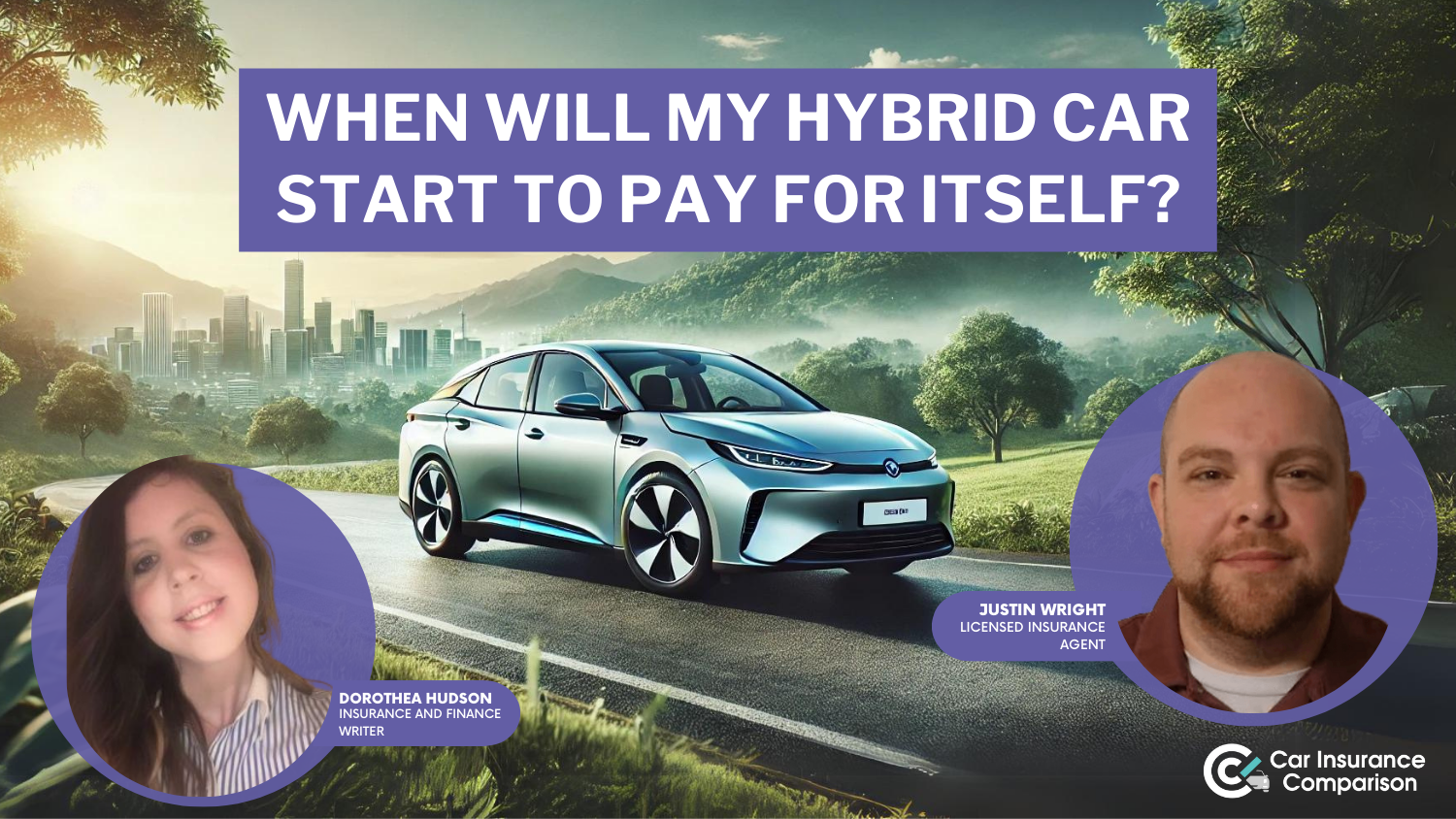When will my hybrid car start to pay for itself?
Sticker prices for hybrid cars mean some pay for themselves right away, including the Lexus NX 350 and Toyota Highlander. Gas mileage is a contributing factor to the cost of hybrid cars. We have the details.
Read more Secured with SHA-256 Encryption





Table of Contents
Table of Contents


Insurance and Finance Writer
Dorothea Hudson has been professionally writing in many spheres since 2013. She has written on entertainment, insurance, finance, travel, technology, AI, renewable energy, crypto, fundraising, and real estate for many websites. Her work has been published for British retailer Marks and Spencer, Kroger Magazine, the Vision Group, and more. Her passions include writing, music, running, travel, te...
Dorothea Hudson


Licensed Insurance Agent
Justin Wright has been a licensed insurance broker for over 9 years. After graduating from Southeastern Seminary with a Masters in Philosophy, Justin started his career as a professor, teaching Philosophy and Ethics. Later, Justin obtained both his Property & Casualty license and his Life and Health license and began working for State Farm and Allstate. In 2020, Justin began working as an i...
Justin Wright
Updated October 2024
Do hybrid cars pay for themselves over time? The answer is generally yes, but how long will it take to buy a car? The prices for hybrid cars differ greatly, and some are more expensive than others, especially compared to their gas-only versions.
Comparing a few vehicles can give you an idea of how much you can save with a hybrid and how long it will take to make up the sticker price versus the cost of gas. Consider comparing multiple car insurance quotes from companies near you by entering your ZIP code into the tool above.
- Hybrid cars have better mileage per gallon (MPG) than their gas-only counterparts
- The sticker price for hybrid cars is often greater than for gas-powered vehicles
- You can save money quickly with a hybrid, if not right away
When will my hybrid car start to pay for itself?
Even if your hybrid gets a lot of miles per gallon, the difference in sticker price might mean it could take a while to make up the cost.
For example, the Nissan Leaf advertises an impressive 99 MPG but has an average cost of $32,000, compared to the Honda Insight, which gets 40 MPG but only costs an average of $26,855. You’d have to save $5,145 in gas before the Nissan Leaf made up the cost difference.
The average American spends $2,053 on gas every year. This means it would take an average of about two and a half years before the two vehicles broke even.
Of course, the cost of gas may not apply to you if you drive significantly less than the average person. Depending on your gas needs, you may make up the difference a lot sooner than the estimated two to three years.
It’s important to take into account how much you pay for gas every year to determine whether the high sticker price is worth the better MPG.
While you’ll be saving on fuel costs, you might also be wondering if you can save on insurance costs. However, you’ll need insurance for a hybrid vehicle, the same as for a gas-only car. Hybrids are not exempt from car insurance requirements.
What about tax incentives?
One bonus reason to get a hybrid over a gas-only vehicle is the tax breaks, which you can get at both a federal and state level. You won’t automatically qualify for a tax write-off for owning a hybrid, but you might be eligible for a tax credit on your return.
The amount you can get back is far from negligible — you can receive up to $7,500. However, not everyone is eligible. For example, the credit only applies to primarily electric hybrids, meaning they have to plug into recharge. Even then, not all vehicles apply.
Free Insurance Comparison
Compare Quotes From Top Companies and Save
Secured with SHA-256 Encryption
Comparing the Prices of Hybrid Cars
When comparing the price of hybrid cars to gas-only, is the added cost worth it? To determine this, look at a few popular 2022 gas-only models with their hybrid counterparts:
- Hyundai Sonata SEL
- Lexus NX 350 AWD
- Honda Accord Sport/Touring Sport
- Toyota Highlander AWD LE
Each of these vehicles has something in common, in that they all have separate gas and hybrid versions.
Hyundai Sonata SEL
This vehicle stands out for just how long it would take to make up the difference in fuel costs. After all, with a $3,850 sticker price difference between the gas-only and hybrid models, and a $740 annual difference in gas savings, the gas savings would take 5.2 years to catch up.
The Hyundai Sonata SEL gets an average of 31 MPG, and its hybrid version gets 47 MPG. This means that the hybrid Hyundai Sonata SEL does a comparably poor job of making up its cost compared to other hybrid vehicles.
Read more: Compare Hyundai Sonata Car Insurance Rates
Lexus NX 350 AWD
The Lexus NX falls at the opposite end of the spectrum. This model makes up for its cost right away because the hybrid model costs merely $500 less than its gas-only counterpart. With an average of 25 MPG for the gas-only version and 39 MPG for the hybrid, you stand to save an average of $1,129 a year at the pump.
Making up the cost difference between these two vehicles hardly even applies, as you’re saving more money by getting the hybrid version within a few months of driving it off the lot.
Honda Accord Sport/Touring Sport
Take a look at something a little more in the middle. The immediate price advantage for the gas-only version of the Honda Accord Sport versus the hybrid comes out to $2,090. The difference in mileage is 26 to 43 MPG, respectively, meaning you save about $1,024 a year on gas.
Running all the numbers, it’ll take about two years even to make up the price difference between the vehicle and gas money.
Toyota Highlander AWD LE
With a $1,450 MSRP difference, you’re not looking at a very large sticker price advantage for the gas-only version of the Toyota Highlander. The MPG compared to the hybrid is notably unalike, however, with 23 MPG for the gas-only type and 35 MPG for the hybrid. You’ll save about $1,004 a year on gas with the hybrid.
This means it’ll take about 1.4 years before the gas price makes up for the MSRP. Compared to others, this vehicle pays itself back relatively quickly. Moreover, Toyota Highlander insurance rates are lower than average, saving you even more.
What You Need To Know About the Prices for Hybrid Cars
You could be in the market for a hybrid for any number of reasons. In addition to being fuel-efficient and economical, they’re better for the environment. Advantages of plug in hybrid vehicles include the ability to drive on electric power alone for shorter trips, which further reduces fuel consumption and emissions. Even if environmental concerns aren’t a primary factor for you, as the difference in sticker price between gas and hybrid cars narrows, affordable hybrid car options become more accessible.
Additionally, there may be any incentives for buying a hybrid, such as tax credits or rebates, which can further reduce the overall cost. As a result, the MPG advantages among hybrids grow, and you may find that a hybrid typically pays for itself quickly, if not right away.
Before you go, consider browsing multiple car insurance quotes from different insurers near you today. Just enter your ZIP code into our tool below.
Free Insurance Comparison
Compare Quotes From Top Companies and Save
Secured with SHA-256 Encryption
Case Studies: When will my hybrid car start to pay for itself?
Case Study 1: Lexus NX 350 AWD
The Lexus NX 350 AWD hybrid model costs only $500 less than its gas-only counterpart. With an average gas mileage of 39 MPG compared to 25 MPG for the gas-only version, the hybrid offers significant savings at the pump. The owner of a Lexus NX 350 AWD hybrid can start recouping the cost difference right away and potentially save an average of $1,129 per year on fuel.
Case Study 2: Toyota Highlander AWD LE
The Toyota Highlander AWD LE hybrid has a sticker price difference of $1,450 compared to the gas-only version. However, with a much higher gas mileage of 35 MPG for the hybrid compared to 23 MPG for the gas-only version, the owner can save about $1,004 per year on fuel. This means the hybrid can pay for itself in approximately 1.4 years.
Case Study 3: Honda Accord Sport/Touring Sport
The Honda Accord Sport hybrid has an initial price advantage of $2,090 over its gas-only counterpart. With a mileage difference of 26 MPG for the gas-only version and 43 MPG for the hybrid, the owner can save approximately $1,024 per year on gas. It would take about two years to make up the price difference between the hybrid and the gas-only model.

Frequently Asked Questions
When will my hybrid car start to pay for itself?
The time it takes for a hybrid car to pay for itself varies depending on the sticker price and the cost of gas. Some hybrid cars, like the Lexus NX 350 and Toyota Highlander, can pay for themselves right away. Gas mileage is a significant factor in the cost of hybrid cars.
How long will it take for my hybrid car to make up the cost difference compared to a gas-only car?
The time it takes to make up the cost difference between a hybrid car and a gas-only car depends on various factors, including the sticker price and the amount of money saved on gas. For example, if a hybrid car costs $5,145 more than a gas-only car and you save $2,053 on gas every year, it would take approximately two and a half years to break even.
Are hybrid cars exempt from car insurance requirements?
No, hybrid cars are not exempt from car insurance requirements. Just like gas-only cars, hybrid vehicles need to be insured according to the laws and regulations of your state.
Are there tax incentives for owning a hybrid car?
Yes, there are tax incentives available for owning a hybrid car at both the federal and state levels. You may be eligible for a tax credit on your return, which can amount to up to $7,500. However, eligibility criteria apply, and not all hybrid vehicles qualify for the tax credit.
Is the added cost of a hybrid car worth it compared to a gas-only car?
Whether the added cost of a hybrid car is worth it depends on various factors, including the price difference, the mileage difference, and your individual driving habits. Comparing the prices and potential savings on gas can help you determine if the added cost is justified.
How do hybrid cars compare in terms of price and mileage to gas-only cars?
Hybrid cars can vary in price and mileage compared to their gas-only counterparts. It’s essential to compare specific models to get a clear picture. For example, the Lexus NX 350 AWD hybrid costs only $500 less than the gas-only version, but it offers significant savings in fuel costs with 39 MPG compared to 25 MPG.
Do hybrid cars pay for themselves quickly?
In many cases, hybrid cars can pay for themselves relatively quickly, especially if they offer significant savings in fuel costs. However, the time it takes to recoup the cost difference between a hybrid car and a gas-only car depends on several factors, including the specific models and individual driving habits.
Does a hybrid pay for itself?
Yes, a hybrid can pay for itself over time through savings on fuel costs. The exact time frame depends on factors like fuel prices, driving habits, and the initial cost difference between the hybrid and a comparable non-hybrid vehicle.
How long does it take for a hybrid car to pay for itself?
On average, it can take anywhere from 5 to 10 years for a hybrid car to pay for itself. This depends on your annual mileage, fuel prices, and the premium paid for the hybrid model over a traditional gasoline vehicle.
How long does it take to break even on a hybrid car?
Breaking even on a hybrid car can take several years. It typically ranges between 5 to 8 years, depending on factors such as fuel savings, maintenance costs, and the price premium of the hybrid model.
How much do you save with a hybrid car?
How much does a RAV4 hybrid battery cost?
How much does it cost to replace a Honda CR-V hybrid battery?
Are Cadillacs expensive to insure?
Are Honda Accord hybrids reliable?
Are Honda hybrids reliable according to Reddit users?
Are hybrid cars worth it?
Are hybrid cars a good investment?
Are hybrid cars better than gas cars?
Are hybrid cars cheaper to insure?
Are hybrid cars expensive?
Are hybrid cars good?
Are hybrid cars reliable?
Are hybrid cars worth the extra money?
Are hybrid SUVs worth the extra money?
How much will I save on gas with a hybrid?
How often should you charge a plug-in hybrid electric vehicle?
How to break in a new hybrid car?
How to start a hybrid car?
Get a FREE Quote in Minutes
Insurance rates change constantly — we help you stay ahead by making it easy to compare top options and save.







